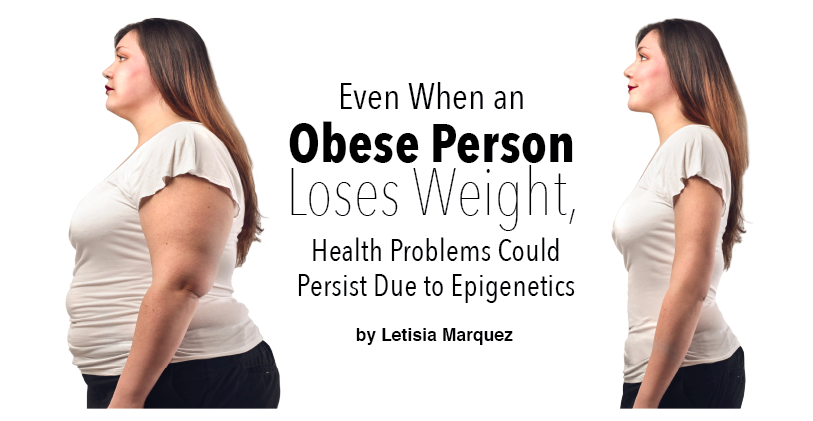 When an obese person loses weight, he or she immediately starts to feel better. Blood pressure improves, cholesterol levels diminish and energy levels rise. Because that person is no longer obese, the risk of developing type 2 diabetes, as well as liver, colon and breast cancers and other diseases linked to obesity, diminishes, right?
When an obese person loses weight, he or she immediately starts to feel better. Blood pressure improves, cholesterol levels diminish and energy levels rise. Because that person is no longer obese, the risk of developing type 2 diabetes, as well as liver, colon and breast cancers and other diseases linked to obesity, diminishes, right?
That might not be the case.
A new study by City of Hope researchers found that even after a low-fat diet is consumed, long-term disease risks could persist.
The reason could be epigenetics, which refers to changes to genes caused by external factors, such as pesticides or nutrients, that don’t change the DNA sequence. However, these changes can be passed to the next generation, according to Dustin Schones, Ph.D., an assistant professor in the Department of Diabetes Complications and Metabolism within the Diabetes & Metabolism Research Institute at City of Hope.
Schones’ obesity research was recently highlighted in the Journal of Biological Chemistry as a “Paper of the Week,” and in this interview, he discusses more about what the study revealed.
Why are you studying obesity?
Worldwide obesity has doubled over the last several decades, leading to an overwhelming health crisis and a significant burden on our health care system. In addition to being a debilitating disease on its own, obesity is also a risk factor for cardiovascular disease, type 2 diabetes and liver, colon, breast and other cancers.
Making matters worse, formerly obese individuals have increased risk for metabolic disorders, such as diabetes, later in life, even after lifestyle changes are made to manage obesity. This is reminiscent of the metabolic memory phenomenon, which refers to diabetic patients whose disease is under control but who are still at risk for long-term health problems.
We think a similar phenomenon could be occurring in people who were once obese. There’s already evidence among these individuals that they have long-term health risks, and are also more susceptible to becoming obese again.
While we know that obesity results from a combination of genetic and environmental factors, what remains poorly understood are the molecular mechanisms contributing to obesity, or how molecules interact in our cells. In laboratory models, we previously demonstrated that a western diet high in fat and sugar causes epigenetic changes in the liver.
These epigenetic changes altered the way key genes functioned, and those changes increased the risks of developing fatty liver disease, diabetes and other disorders. We also found that some animal models were more susceptible to long-term health risks on that diet than others, indicating genetics are involved as well.
What is the study’s main finding?
Building upon our previous work, we examined if a healthier diet – one with little fat and sugar – could reverse the epigenetic changes we observed in the liver and what impact that had on long-term health risks.
This study demonstrated that certain animal models who were obese and then ate a low-fat-and low-sugar diet were still at a higher risk of developing metabolic disorders. Even though they were no longer obese, an unhealthy diet had caused irreversible epigenetic changes in the liver that we previously studied and the disease risks continued. But in other animal
models, epigenetic changes did change back, health
improved and the disease risks diminished.
What this tells us is that once people with certain genetic makeup are obese – even if they lose weight – they could still face future health risks due to the epigenetic changes induced by obesity. So a person’s genetics could play a critical role in determining whether people who were once obese will always be at risk for long-term health problems.
What are next steps?
City of Hope researchers are trying to understand how molecules interact to cause obesity and related health complications, including cancer and type 2 diabetes. Understanding these topics will help us in developing novel therapeutic targets for
people who are obese and want to achieve a healthy weight and reduce risk of disease.
One idea is to develop more personalized medicine for people who are obese, similar to what is being done now to target specific cancers and their genetic makeup. We’re also thinking about the obesity problem long-term – even if a patient is able to lose some weight, they could continue to be at risk for developing health problems, and that could be due to genetics.
What might you say to people who are obese and think it’s not important to lose weight because genetics could still put them at risk for developing obesity-related diseases?
Certain animal models in our studies had some long-term health risks due to obesity but it’s important to emphasize that others did not. Regardless, the health benefits of losing weight still outnumber those of being obese. There are immediate benefits such as better heart health, as well as lower cholesterol and blood pressure levels.
Research reported in this publication was supported by National Institutes of Health under grant numbers K22HL101950, T32DK007571-24, 1K01DK104993, R01HL106089 and RO1DK065073, as well as Schaeffer Endowment funds. It included work performed in the Pathology and Integrative Genomics Cores of the City of Hope supported by grant number P30CA33572. The content is solely the responsibility of the authors and does not necessarily represent the official views of the National Institutes of Health.

 Login
Login
